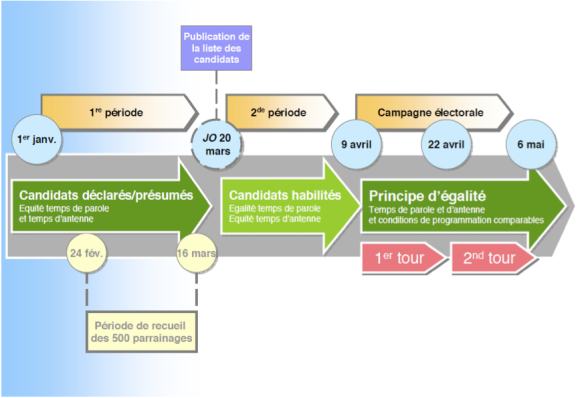France has stringent campaign rules, especially when it comes to media coverage, but the web is disturbing this finely tuned framework.
The Conseil Supérieur de l’Audiovisuel (or CSA, an administrative media watchdog) closely supervises the amount of airtime and coverage each candidate gets, excluding newspapers and magazines from the tally because their influence is seen as weaker than television’s or radio’s. Below (in French) is a graphic that explains how the process is divided up in time before and during the official campaign.
Since last week the ten official candidates have to receive equal airtime and equal speaking time. But what about online content that doesn’t emanate from a traditional media? Contrary to your more traditional election, candidates can now address their electorate directly on the web, without going through the gateways of television, radio or press.
This creates a difficult regulatory situation for the CSA. Candidates have always tried to seize every small occasion to mitigate the effects of equal airtime, by increasing the number of interviews with the local press or using activists on the ground to put up posters and distribute pamphlets. But the web offers unlimited possibilities to not only circumvent CSA regulations through in-house productions (videos, podcasts, etc.) but also to spread these productions online. François Hollande’s campaign recently launched Radio Hollande, a daily podcast. Listen to the first episode below.
Nicolas Sarkozy also launched a mini web-series called “The Experts”, in which UMP personalities are interviewed. Jean-Luc Mélénchon, the Front de Gauche candidate, has had a mini-series for several months. But none of these web initiatives should worry the CSA: so far, their impact is negligible. Sarkozy’s videos garner a few thousand of views at best, as does Radio Hollande. Mélenchon’s web series have a wider following (the last episode was seen over 27,000 times), but the numbers still pale in comparison to the millions one can reach on a television show.
These small initiatives on the web aren’t a real problem for the CSA. The more pressing issue is what will happen when the first preliminary results leak online and possibly influence the vote in cities where polling stations close later. In the 2007 presidential elections numbers were leaked onto Twitter. Back then social media had barely taken off, but Facebook, Twitter and other networks have a massive presence today. Fines and sanctions are planned for those who spread preliminary results online, but it remains to be seen how effective they will be.

[…] on the main four or five? asks my fictional American audience. In France, CSA regulations (see my previous post for an explanation) make this impossible. All candidates need equal airtime, and favoring […]
[…] activists, not ordinary voters; that an exclusive web debate never saw the light; or that the web-initiatives undertaken by candidates to circumvent CSA regulations had little effect. All in all, the web is a […]